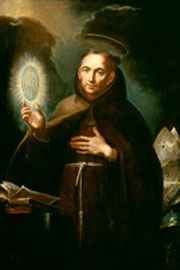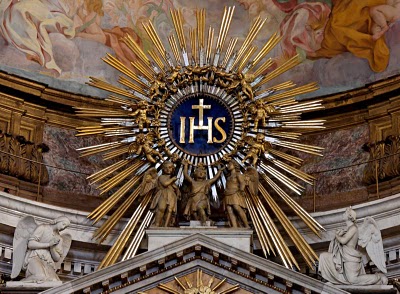

In that season of the Liturgical Year when we were kneeling in love and prayer around the crib of the Infant Jesus, one day was devoted to the celebration of the glory and sweetness of His Name. Holy Church was full of joy when She pronounced the dear Name chosen from all eternity by Her Heavenly Spouse; and mankind found consolation in the thought that the great God Who might so justly have bid us call Him the Just and the Avenger, willed us henceforth to call Him the Savior. The devout St. Bernardine of Siena, whose feast we keep today, stood then before us, holding in his hands this ever blessed Name, surrounded with rays. He urged the whole earth to venerate with love and confidence the Sacred Name which expresses the whole economy of our salvation. The Church, ever attentive to what is for the good of Her children, adopted the beautiful device. She encouraged them to receive it from the Saint, as a shield that would protect them against the darts of the evil spirit, and as an additional means of reminding ourselves of the exceeding charity wherewith God has loved this world of ours. And finally, when the loveliness of the Holy Name of Jesus had won all Christian hearts, She instituted in its honor one of the most beautiful feasts of Christmastide.
St. Bernardine, the worthy son of St. Francis of Assisi, returns to us on this 20th day of May, and the sweet flower of the Holy Name is, of course, in his hand. But if it is not the endearing Name, respectfully and lovingly whispered by the Virgin-Mother over the crib; it is the Name whose sound has gone through the whole creation, it is the trophy of the grandest of victories, it is the fulfillment of all that was prophesied. The Name of Jesus was a promise to mankind of a Savior; Jesus has saved mankind, by dying and rising again; he is now Jesus in the full sense of the word. Go where you will, and you hear this Name – the Name that has united men into the one great family of the Church.
The chief priests of the Synagogue strove to stifle the Name of Jesus, for it was even then winning men's hearts. They forbade the Apostles to teach in this Name; and it was on this occasion that St. Peter uttered the words which embody the whole energy of the Church: We ought to obey God rather than men (Acts 5: 28-29). The Synagogue might as well have tried to stay the course of the sun. So too, when the mighty power of the Roman Empire set itself against the triumphant progress of this Name, and would annul the decree that every knee should bow at its sound, its attempt was a complete failure, and at the end of three centuries the Name of Jesus was heard and loved in every city and hamlet of the Empire.
Armed with this sacred motto, St. Bernardine traversed the towns of Italy, which at that period (the 15th century) were at enmity with each other, and not unfrequently torn with domestic strifes. The Name of Jesus, which he carried in his hand, became as a rainbow of reconciliation; and wheresoever he set it up, there every knee bowed down, every vindictive heart was appeased, and sinners hastened to the sacrament of pardon. The three letters I H S (a contraction of the Greek spelling) which represent this Name, became familiar to the faithful; they were everywhere to be seen carved, or engraven, or painted; and the Catholic world thus gained a new form whereby to express its adoration and love of its Savior.

St. Bernardine was a preacher of inspired eloquence. He was also a distinguished master in the science of sacred things, as is proved by the writings he has left us. One such regards the apparition of Jesus to His Blessed Mother after the Resurrection:
"From the fact of there being no mention made in the Gospel of the visit wherewith Christ consoled His Mother after His Resurrection, we are not to conclude that this most merciful Jesus, the source of all grace and consolation, Who was so anxious to gladden His disciples by His presence, forgot His Mother, Who He knew had drunk so deeply of the bitterness of His Passion. But it has pleased Divine Providence that the Gospel should be silent on this subject; and this for three reasons.
"In the first place, because of the firmness of Mary's faith. The confidence which the Virgin-Mother had of Her Son's rising again had never faltered, not even by the slightest doubt. This we can readily believe, if we reflect on the special grace wherewith She was filled, She the Mother of the Man-God, the Queen of the Angels, and the Mistress of the world. To a truly enlightened mind, the silence of Scripture on this subject says more than any affirmation could have done. We have learned to know something of Mary by the visit She received from the Angel, when the Holy Ghost overshadowed Her. We met Her again at the foot of the Cross, where She, the Mother of Sorrows, stood nigh Her dying Son. If then the Apostle could say: As ye are partakers of the sufferings, so shall ye be also of the consolation (2 Cor. 1: 7), what share must not the Virgin-Mother have had in the joys of the Resurrection? We should hold it as a certain truth that Her most sweet Jesus, after His Resurrection, consoled Her first of all. The Holy Roman Church would seem to express this, by celebrating at St. Mary Major's the Station of Easter Sunday. Moreover, if from the silence of the Evangelists you would conclude that our Risen Lord did not appear to Her first, you must go farther, and say that He did not appear to Her at all, inasmuch as these same Evangelists, when relating the several apparitions, do not mention a single one as made to Her. Now, such a conclusion as this would savor of impiety.
"In the second place, the silence of the Gospel is explained by the incredulity of men. The object of the Holy Ghost, when dictating the Gospels, was to describe such apparitions as would remove all doubt from carnal-minded men with regard to the Resurrection of Christ. The fact of Mary's being His Mother would have weakened Her testimony, at least in their own eyes. For this reason She was not brought forward as a witness, though most assuredly there never was or ever will be any creature (the Humanity of Her Son alone excepted) whose assertion better deserved the confidence of every truly pious soul. But the text of the Gospel was not to adduce any testimonies, save such as might be offered to the whole world. As to Jesus' apparition to His Mother, the Holy Ghost has left it to be believed by those that are enlightened by His light.
"In the third place, this silence is explained by the sublime nature of the apparition itself. The Gospel says nothing regarding the Mother of Christ after the Resurrection; and the reason is, that Her interviews with Her Son were so sublime and ineffable that no words could have described them. There are two sorts of visions: one is merely corporal, and feeble in proportion; the other is mainly in the soul, and is granted only to such as have been transformed. Say, if you will, that St. Mary Magdalen was the first to have the merely corporal vision, provided that you admit that the Blessed Virgin saw, previously to Magdalen, and in a far sublimer way, Her Risen Jesus, that She recognised Him, and enjoyed His sweet embraces in Her soul, more even than in Her body."
Let us now read the Life of the Saint, as given in the Lessons of today's Divine Office:
Bernardine Albizeschi, whose parents were of a noble family of Siena, gave evident marks of sanctity from his earliest years. He was well brought up by his pious parents. When studying the first rudiments of grammar, he despised the favorite pasttimes of children, and applied himself to works of piety, especially fasting, prayer, and devotion to the Blessed Virgin. His charity to the poor was extraordinary. In order the better to practice these virtues, he later on entered the Confraternity which gave to the Church so many saintly men, and was attached to the hospital of Our Lady of Scala, in Siena. It was there that, whilst leading a most mortified life himself, he took care of the sick with incredible charity during the time when a terrible pestilence was raging in the city. Amongst his other virtues, he was preeminent for chastity, although he had many dangers to encounter, owing to the beauty of his person. Such was the respect he inspired that no one, however lost to shame, ever dared to say an improper word in his presence.
After a serious illness of four months, which he bore with the greatest patience, he began to think of entering the Religious life. As a preparation for such a step, he hired, in the farthest outskirts of the city, a little hut, in which he hid himself, leading a most austere life, and assiduously beseeching God to make known to him the path he was to follow. A divine inspiration led him to prefer to all other Orders that of St. Francis. Accordingly he entered, and soon began to excel in humility, patience, and the other virtues of a Religious man. The Guardian of the Convent perceived this, and knowing already that St. Bernardine was well versed in the sacred sciences, he imposed upon him the duty of preaching. The Saint most humbly accepted the office, though he was aware that the weakness and hoarseness of his voice made him unfit for it; but he sought God's help, and was miraculously freed from these impediments.
Italy was at that time overrun with vice and crime; and in consequence of deadly factions, all laws, both divine and human, were disregarded. It was then that St. Bernardine went through the towns and villages, preaching the Name of Jesus, which was ever on his lips and heart. Such was the effect of his words and example, that piety and morals were in great measure restored. Several important cities, that had witnessed this zeal, petitioned the Pope to allow them to have St. Bernardine for their Bishop; but the Saint's humility was not to be overcome, and he rejected every offer. At length, after going through countless labors in God's service, after many and great miracles, after writing several pious and learned books, he died a happy death, at the age of 66, in a town of the Abruzzi, called Aquila. New miracles were daily being wrought through his intercession, and, at length, in the sixth year after his death, he was canonized by Pope Nicholas V.
Contact us: smr@salvemariaregina.info
Visit also: www.marienfried.com